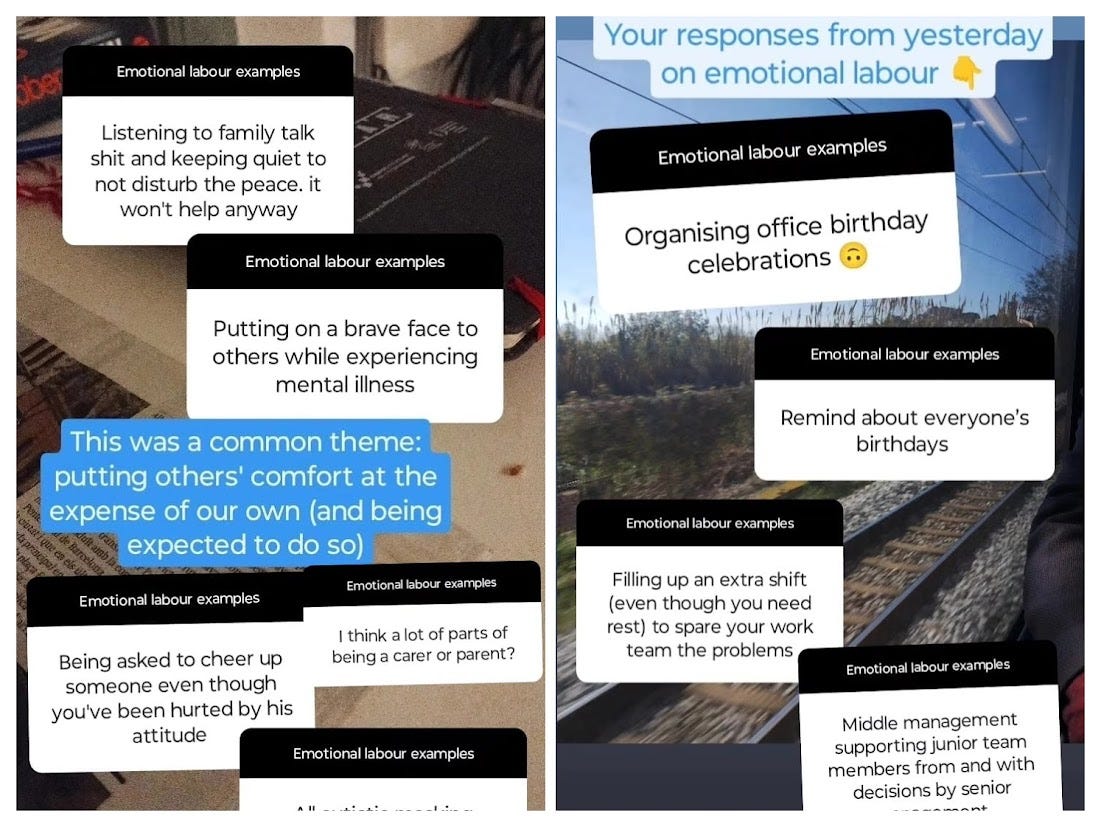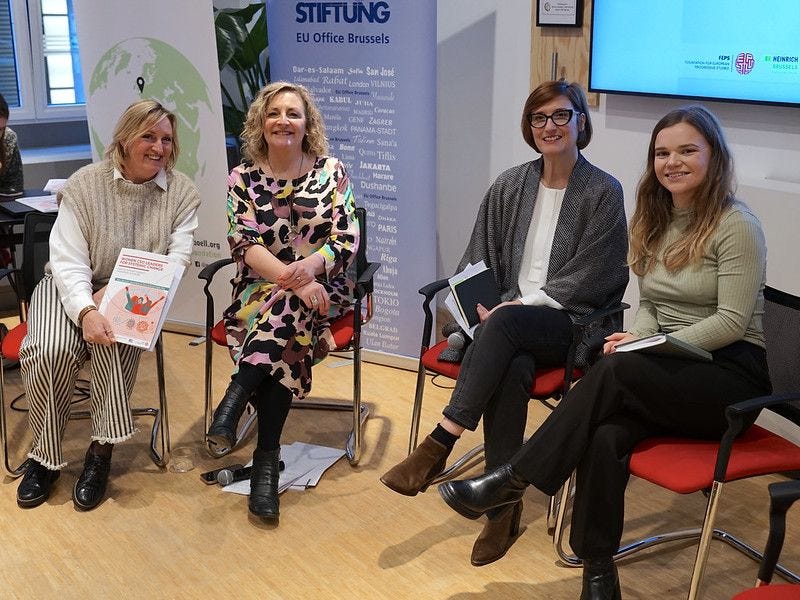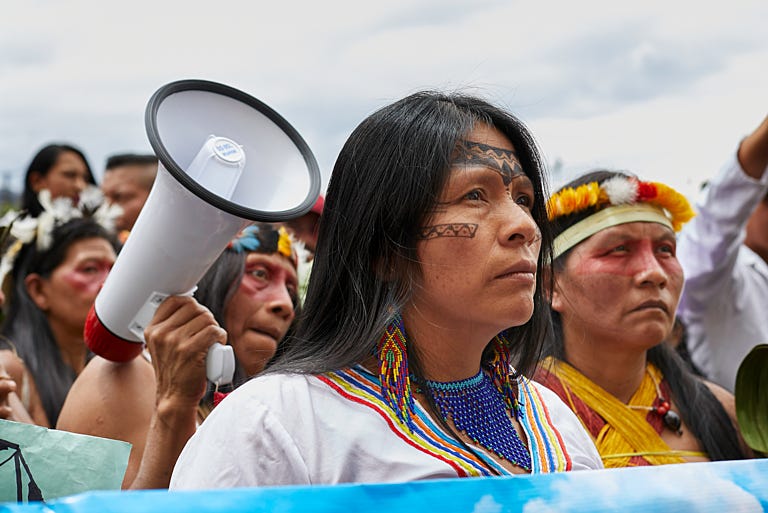Women can do anything. But at the moment they're doing everything.
The power woman shouldn't have to do it all. Feminist leadership helps us all.
“For the master's tools will never dismantle the master's house. They may allow us temporarily to beat him at his own game, but they will never enable us to bring about genuine change.” Audre Lorde.
“Look Cass!” a previous housemate of mine once said. I paused my work and took out my headphones to turn to him. “Look, I’m vacuuming.”
“Um,” I said. “OK.”
He soured. “I thought you’d be happier.”
Let’s talk about emotional work. We’ve all experienced this in some form.
Plastering on a polite smile in a soul-crushing customer service job, spending evenings listening to the friend in neverending crisis who forgets to ask how you are, or carefully suppressing our opinions and identities to keep a family dinner ‘pleasant.’ Anything to prioritise the comfort and feelings of others at our own expense.

This edition is on women leaders, and the stresses they face. Although emotional work isn’t exclusively gendered, both in and out of the workplace, women are taking the brunt of it. Our feelings are our problem to manage - and so are everyone else’s feelings, apparently.
It’s connected to the concept of mental load. Women are still doing more of the housework - even women in full-time leadership roles at work - and also coordinating that work. Leisure time has gone up for men and down for women.
Mental load means remembering upcoming birthdays, noticing what needs to be done, making appointments and reminding their family members to go to them - but god forbid you bring up your crippling period cramps. Nobody wants to hear about that. After all, your friend/colleague/partner has had a bad day and wants to rant about it.
It’s insidious and exhausting - not least because those who don’t do emotional or mental work are unlikely to believe it exists. Or claim that ‘women are better with that stuff anyway.’
Offended men, please refrain from reaching out to tell me that you specifically don’t do this. Every time I write about feminism I get a flurry of messages from men letting me know that they’re not part of the problem, or that they struggle too, or they agree but do I have to be so aggressive about it?
I don’t. But rich white men didn’t have to seize most of the world’s wealth either and yet here we are.
In fact, this tone policing is part of emotional work. Black activists know this phenomenon very well. We’re allowed to have a say - as long as that say is worded in exactly the right way, the right tone, and we don’t ‘nag’ about it.
The revolution is here as long as it doesn’t make anyone uncomfortable. Thank you so much for letting me have a place at the table - but no worries if not!!
Let’s be clear: nobody is winning in this status quo. Men, it’s not my job to validate you for being a decent self-aware human being. Don’t devalue yourself by imagining this is the extent of what you can contribute. By viewing worldwide sexist issues purely through the lens of your individual actions, you miss the point.
Nobody has ever congratulated me for vacuuming my own damn floor. Just like they shouldn’t laud me for championing racial justice just because I’m not racially harassing anyone. And they shouldn’t. Not being openly sexist is not the same as being feminist.
The myth that women are ‘better with feelings’ is making everyone unhappy. Men are depressed. To me, this tone policing, picking fights, mining women for constant validation and micromanagement of our own feelings (don’t get so upset) is a symptom of a deeper ennui that never gave men a space to have feelings - and it’s women who have to pick up the pieces.
But creating a more just world involves some discomfort for all of us, all genders included. It’s always uncomfortable to leave the comfort zone, even the one that hurts us. Growing pains might be a better term.
We shouldn’t have to be strong and resilient and exhausted. When we burnout, the planet burns. When we support each other, the whole ecosystem thrives.
Cover image from UN Women/Carlos Rivera.
What’s Going On?
Network of climate science deniers accused of “hijacking” rural concerns driving farmer protests.
Related: The rise of agroecology adapting agriculture for an uncertain world.Revealed: the 1,200 big methane leaks from waste dumps trashing the planet.
Related: I saw the future of climate technology—and its big-oil investors.European Commission calls for 90% cut in EU emissions by 2040.
Related: Here’s your life in 2040 — if the EU’s climate plan works.Oil Industry deceived public on recycling use for more than 50 years.
Related: The EU is trusting fossil fuel firms to help clean up the carbon.You probably underestimate how many people care about the climate.
Related: Minority German party FDP trying to sabotage crucial law for corporate accountability with fake news campaign.
HEY THERE: We’re unfunded. You help us a lot by tipping us a virtual coffee.
Focus On… Supporting Feminist Leadership
Joanna Maycock talks to Cass Hebron to introduce a new report on the barriers and opportunities for women leaders in civil society.

I am Joanna Maycock, a feminist activist and organiser with over 30 years of experience in Brussels. As the former head of the European Women’s Lobby and Co-President of W100, a women’s collective in Brussels, I've witnessed both progress and challenges in advancing gender equality and supporting women leaders.
Together with Céline Charveriat, Angela Philp, and Eloise Bodin, we embarked on the journey to explore and address the growing pressures faced by women leaders in Civil Society Organisations (CSOs). Our goal was to understand how to support feminist leadership in Europe, culminating in the report "Women CSO Leaders for Systemic Change."
What does feminist leadership mean?
Feminist leadership represents a progressive approach that prioritises social and environmental transformation. It challenges traditional power structures and emphasises inclusivity, collaboration, and care. Women's organisations in the Global South played a significant role in developing and documenting the concept.
Srilatha Batliwala, from NGO CREA, is a prominent thought leader and practitioner in this field. She describes feminist leadership as “a process of transforming ourselves, our communities, and the larger world to embrace a feminist version of social justice. It's the process of working to make the feminist vision of a non-violent, non-discriminatory world, a reality. It's about mobilising others around this vision of change.”
What obstacles are women CSO leaders facing in Europe? Isn't it a lot easier for women to hold positions of power now?
There have been significant strides in addressing gender disparities within CSOs over the past 25 years. However, women in leadership roles often face insufficient support and unrealistic expectations. The feminisation of the sector hasn't translated into equitable support for women leaders, who grapple with structural challenges and systemic gender biases.
“I can’t focus on bigger writing tasks. I can’t concentrate. Many times it is between cooking and replying to an important email. Or between washing the clothes and going to an evening meeting. Cleaning the household all Saturday, cooking half of Sunday, taking the family out on a trip Sunday afternoon and not having any time OFF... just for myself. Thus going to work exhausted on Monday. It is like going from work to work…”
Testimonial from report
CSOs are also not immune to the gender stereotypes and discrimination prevalent in wider society. Women continue to shoulder the majority of care work, both at home and in the workplace.

Our research also uncovered the taboo nature of issues like heavy periods, menopause, pregnancy loss, and infertility treatment within CSOs, with inadequate workplace policies to support women experiencing these challenges.
“I am often in severe pain at work, but I do not feel that I am in a safe space to talk about this or communicate about this, nor do I feel able to take time off when I need it.”
In my experience, it’s not easy to practice leadership in a radically different way within the constraints of our political culture which is still very rooted in gendered stereotypes and extremely competitive, insecure and fearful.
Personally my main sources of support have always come from other women. It is impossible to experiment with dramatically different leadership models or to take on patriarchal norms without the spaces to share and learn together!
I have been told that we burn out because we're prone to perfectionism, or that everyone is struggling. How far is the high level of burnout a gendered/systemic issue?
There are some specifics that add additional pressure for women in leadership. Our research reveals a gendered dimension to the high levels of burnout among women leaders in CSOs.
Our organisations are still built on outdated gendered roles and stereotypes: women are still taking on the undervalued caring roles; they still get access to less support and training. To top it all, we all still have to face the infuriating and damaging “micro” agressions that continue to belittle and invisibilise our concerns.
Why is feminist leadership an environmental issue?
Ultimately, feminism is a call to action—to dismantle systems of oppression and create a more just and equitable world for all. It challenges us to rethink power dynamics, reimagine social structures, and prioritise care, empathy, and sustainability in all aspects of life.

Ecofeminism offers a powerful critique of systems that prioritise profit over people and planet, advocating for alternative models based on sustainability and cooperation. It calls for a shift away from exploitative and extractive practices towards holistic approaches that honour the inherent value of all life.
As a feminist leader in social movements for over 20 years, I have been part of many coalitions and movements tackling intersecting systemic challenges. Progress has been uneven, and we are currently witnessing regression and backlash on several fronts all over Europe.
This is because we’re not building intersectional movements for deeper systemic change, and too often, civil society leadership and campaigning replicate the same patriarchal structures and behaviours of competition and power. It has often astounded me to see the underlying impact of patriarchy and the clear feminist analysis being completely overlooked by NGOs and movements who continue to operate within outdated structures and working cultures.
How do we support women leaders in the short- and long-term to break out of this systemic status quo?
To support women leaders in the short and long term, addressing structural barriers and fostering an enabling environment is crucial. This means revising organisational practices, investing in leadership development, and combating misogyny within CSOs and wider society. Political support, partnership-based funding models, and resources for organisational development and training are essential for empowering women leaders to navigate and challenge systemic inequalities effectively.
If I look back on my thirty years of feminist and social justice campaigning, my top five pieces of advice for anyone reading this today would be:
You are not alone! Find allies: join, create, or build women’s networks both inside and outside your organisation. You are not alone; it is NOT you, it's the system that is messed up! A sign that your organisation is not feminist is if it refuses to allow space for women to gather. This is not to say that other more mixed spaces are not needed, but it is seemingly still subversive to demand a women’s space. Try it and find out!
Remember this work is hard! Try to establish boundaries and protect your time off and please take your holidays. I always schedule at least one 3-week holiday each year with a strict no work policy. Even if it means staying at home you can catch up with some books, TV and seeing family and friends. It will do you the world of good and help you gain much needed perspective and rest!
Get support and training. It is not a sign of weakness but rather a very wise move to ask for help and support. This includes training opportunities on feminist leadership, or countering power domination techniques and microaggressions.
We need to advocate for resources and support within organisations and funding bodies to be allocated for leadership development, culture shift and collaboration.
Don’t compete amongst women! Don’t be afraid to redistribute responsibility more evenly. If you are in a leadership role, you need to ensure others are also getting interesting opportunities, and you need to be able to step back from delivering to provide strategic overview thinking and guidance.
“Keep fighting. There is hope. Things have been changing. It is essential to invest in hope and building positive energy to sustain us in the face of huge and sometimes overwhelming challenges.” List of tips from women leaders in report, p. 50
Shoutout! Sign up and save the world
one5c is the original optimistic climate action newsletter. The editors of one5c curate the news and advice individuals need to help build a more sustainable future. Subscribe here.
So Now What Do I Do?
LEARN
We’re holding a workshop! Join The Green Fix on 13th March in Brussels for a workshop on learning how to advocate for an environmentally just economy, as part of EU Bioeconomy Week.
Check out the Lazy Women podcast for discussions on navigating being a woman in this political and social era.
Read: Grist’s Imagine 2200: Climate Fiction for Future Ancestors short story winners.
TRY SOMETHING
The Daniel Singer Foundation is offering a $10,000 prize for a published article about the Russian invasion of Ukraine. Deadline 1 March.
Masters and PhD students are invited to apply for the Berlin Shift summer school on co-creating cities to thrive with nature. Deadline 7 March.
Join the Energy Communities Forum in Prague this May to learn how to help propel energy democracy. Register by 11 March.
CHANGE THE SYSTEM
A series of conferences about post-growth economies are taking place across Europe in the coming months! See what’s happening in your country.
Help Generation Climate Europe by filling out their survey on energy affordability for young people.
Here’s a list of trusted organisations to donate to help Palestine.
By the way…
We’ve got a survey! Take 5 minutes to tell us what you want to know about in this newsletter.
The Green Fix is now offering low-cost sponsored slots on the newsletter. Book your slot by emailing wearethegreenfix@gmail.com.
Stay in the loop
You can follow us on Twitter @TheGreenFix, Instagram @thegreenfix_ and LinkedIn. Connect with Cass on Instagram @coffee_and_casstaways and LinkedIn Cass J Hebron.







I personally believe women are expected to do it all and not say a word about it, I have had a ridiculous amount put on my should on top of being a stay home mom and even when I worked it was bad too, I’m raising two children plus caring for four cats and a dog plus housework on top of pursuing my own crafts and hobbies but when I get sick I all of a sudden can’t get the help I need.
Brilliant topic, well explored. Thank you. A while back the Dalai Lama said the world will be changed (or saved?) by Western women. I won’t presume to say what he meant but for me, it’s about empathy combined with our enormous privilege. I have much internalized misogyny to overcome but I won’t let that stop me.